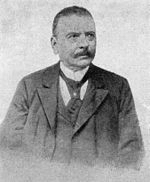How to Pronounce Giovanni de Ciotta
#50
Most Popular
Boost
Apr 24, 1824 Rijeka, Primorje Gorski Kotar County, Croatia Died on 01 Jan 1903 (aged 78)
Hungarian politician
TaurusGiovanni De Ciotta, Date of Birth, Place of Birth, Family, Facts, Age, Net Worth, Biography and More in FamedBorn.com

Hungarian politician
Taurus